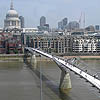News
With the day of the referendum on the UK voting system drawing nearer, Tony Crilly uses a toy example to compare the first past the post, AV and Condorcet voting systems, and revisits a famous mathematical theorem which shows that there is nothing obvious about voting.
Topologists famously think that a doughnut is the same as a coffee cup because one can be deformed into the other without tearing or cutting. Topology doesn't care about exact measurements of quantities like lengths, angles and areas. Instead, it looks only at the overall shape of an object, considering two objects to be the same as long as you can morph one into the other without breaking it. But how do you work with such a slippery concept? One useful tool is what's called the fundamental group of a shape.
Last week leading researchers in sports technology met at the Royal Academy of Engineering in London to demonstrate just how far their field has come over recent years. The changes they make to athletes' equipment and clothes may only make a tiny difference to their performance, but once they're added up they can mean the difference between gold and silver.
The Abel Prize 2011 goes to John Willard Milnor of Stony Brook University, New York for "pioneering discoveries in topology, geometry and algebra".
Physicists at the University of California, Los Angeles set out to design a better transistor and ended up with a discovery that may lead to a new explanation of electron spin and possibly even the nature of space.
The Rolf Schock Prize in Mathematics 2011 has this week been awarded to Michael Aschbacher "for his
fundamental contributions to one of the largest mathematical projects ever, the classification of
finite simple groups".
Our cities are filled with buildings, roads, cars, buses, trains, bikes, parks and gardens. They are crisscrossed with power, water, sewage and transport systems. They are built by engineers, architects, planners, technologists, doctors, designers and artists. Our cities are shaped by our environment, our society and our culture. And each and every part is built on mathematics.
You can join Plus author and Charles Simonyi Professor for the Public Understanding of Science, Marcus du Sautoy, on a mathematical adventure in the city. Marcus and his team of mathemagicians are constructing walking tours of the city — but they need your help!
With 500 days to go everyone here at the MMP is getting very excited about the 2012 Olympic and Paralympic Games. In July 2012 medals will be won, records broken and stories of triumph and tragedy will be told — and here at Plus we are looking forward to revealing the mathematics behind them.
Rising like a giant pringle from the Olympic Park construction site, the Velodrome is the first of the 2012 London Olympic venues to be completed. With its sweeping curved roof and beautiful cedar clad exterior the Velodrome is a stunning building. But what most of the athletes are excited about is the elegant wooden cycle track enclosed inside, the medals that will be won, and the records that might be broken, in the summer of 2012.
Today is Pi day - it's March 14th, written as 3/14 in the US - and to celebrate we bring you some of our favourite Pi articles:
